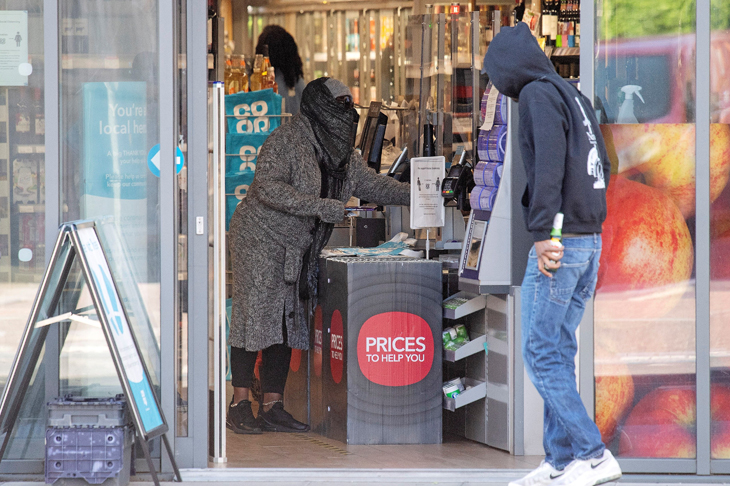The Co-op is one of the UK’s oldest convenience stores and one of the largest, with around 70,000 employees. Since opening its first store in the working-class town of Rochdale, Lancashire, in 1884, it has operated democratically as a consumer-owned co-operative, aiming to meet the needs of its members and the wider community.
But now, when you walk into any of its 3,000 outlets, you’ll quickly find that all signs of trust and solidarity with members are gone. Last week, upon entering my local store, I was met with a life-size cardboard cutout of a rather stern-looking police officer. The traditional store layout has also changed. In its place is a futuristic, Amazon-style pick-up point. Many of the company’s products are locked away. When you wander around to see what’s on offer, you are greeted with just a small selection of items. Empty jars of coffee, known as dummy jars, line the shelves, while steaks and cheeses are given security tags. After a brief chat with an employee, I found out the food retailer did this to prevent theft.
The Co-op reported 175,000 retail crimes in the first half of the year – a 35 per cent increase over the same period last year. The data would appear to paint a similar picture across the entire retail network.
According to the British Retail Consortium (BRC), retail theft in the UK has grown 32 per cent since 2021, making it a £1 billion industry. BRC data show that the number of shoplifting incidents has risen from 2.9 million in 2017 to a whopping 7.9 million last year.
Threats of violence and abuse against retail workers have doubled since before the coronavirus, reaching 867 attacks per day, mostly related to theft. However, the number of shoplifting cases registered by the police and resulting in criminal charges fell from 32 per cent in 2015 to 13 per cent last year, according to Home Office data.
Security guards are increasingly being instructed not to confront shoplifters as retailers fear they will be sued if employees or suspects are injured in scuffles. They are instructed to remotely monitor potential suspects and use CCTV footage to identify suspects before contacting the police. But the police rarely arrive. A freedom of information request made by the Co-op found that an average of 71 per cent of serious retail crimes were not responded to by the police.
A change in the law has been cited as a reason why shoplifting has increased and police are less likely to arrest suspects. The Anti-Social Behaviour, Crime and Policing Act 2014 aims to put victims of crime first and empower law enforcement to curb anti-social behaviour. However, what it did was effectively decriminalise low-level shoplifting. Under Section 176 of the Act, goods valued at less than £200 are considered a summary offence – equivalent to a misdemeanour. The purpose of this change was to streamline the judicial system and make it more efficient by focusing on more serious and ‘high-value’ cases.
With food inflation expected to reach 15 per cent this summer and fresh food prices hitting record highs, some are using the cost-of-living crisis as an excuse to steal. ‘I need to feed my family!’ This is a common reaction among shoplifters. In fact, most thefts are committed by organised gangs, taking advantage of the increasingly lenient criminal justice system. Others are motivated by drug abuse.
But cracking down on repeat offenders is not the solution. There is little evidence that proves short prison sentences significantly reduce recidivism because they leave little room for rehabilitation. Putting a heroin addict in prison for six months is like giving a car thief an internship as a taxi driver.
Besides, we don’t have the space. England’s prisons are already overcrowded. There are more than 85,000 prisoners held in England and Wales, some of whom are forced to live together in what should be a single-occupancy cell. The situation is so dire that porta-cabins have been deployed to deal with the overflow. It’s also expensive. It costs about £40,000 to keep someone in prison for a year. It’s cheaper to go to university. Ironically, though, prison is a great place to learn to be a better criminal.
Those who operate organised crime gangs should be prosecuted, but drug-addicted shoplifters should be sent to inpatient rehabilitation. The money saved for both taxpayers and businesses is definitely an option worth trying. However, the idea of personal responsibility is an alien concept to some.
The progressive left has little to no problem with theft. During the Black Lives Matter protests, some racial justice activists described the looting as liberation – convincing themselves that stealing TVs and Nikes contributes to the fight against racism. The truth is that shoplifting destroys profits and puts people out of work. Businesses operate on very small profit margins. If goods are stolen, retailers have little choice but to raise prices. In some cases, the store may be completely closed. With thefts soaring, stores like the Co-op have warned they may not operate in certain areas. Contrary to leftist thinking, poverty doesn’t cause crime. It’s the other way around.
I went back a few days ago and noticed that the cardboard officer was gone. Staff told me someone had pinched it. I know times are tough, but I don’t think there’s much nutritional value in a 6-foot piece of cardboard, but I guess it’s enough to feed a family of four.
Got something to add? Join the discussion and comment below.
Get 10 issues for just $10
Subscribe to The Spectator Australia today for the next 10 magazine issues, plus full online access, for just $10.
You might disagree with half of it, but you’ll enjoy reading all of it. Try your first month for free, then just $2 a week for the remainder of your first year.














Comments
Don't miss out
Join the conversation with other Spectator Australia readers. Subscribe to leave a comment.
SUBSCRIBEAlready a subscriber? Log in